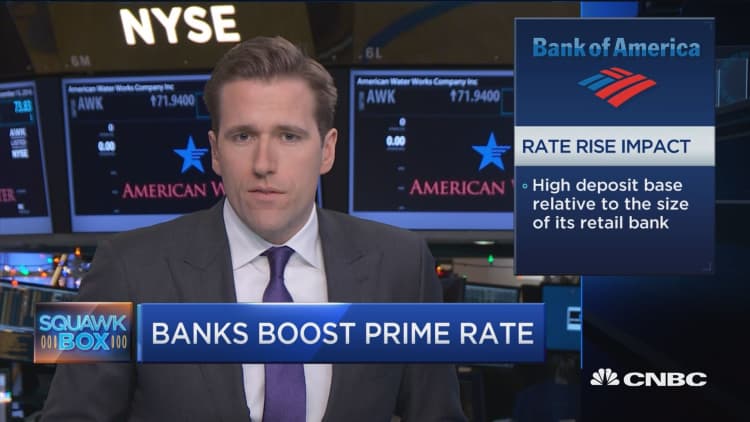You'll be waiting a long time for that interest rate bonanza on your savings account.
Though the Federal Reserve on Wednesday approved only its second interest rate increase in a decade, it will take some time for banks to pass on those higher rates to customers who hold certificates of deposit and savings accounts.
Though borrowers may feel the pain right away in the form of higher rates on credit cards, home equity lines of credit and variable rate student loans, it'll take time for savers to see any kind of improvement.

"What's so odd about interest rate increases from the Fed, is that there is a lag between when rates increase on loan products and when rates increase on bank deposits," said James A. Cox III, a financial advisor at Harris Financial Group in Chesterfield, Virginia.
"It isn't a one-for-one increase," he said.
Sharing the wealth
Conservative investors aren't getting much for stashing their cash in these supposed safe havens.
The average interest rate on a savings account is in the neighborhood of 0.11 percent, according to Bankrate.
Banks won't become more generous overnight, even with this rate increase.
Here's why: The Fed increased the federal funds rate — the rate at which banks lend to each other overnight — by a quarter of a percent. It's up to any given bank to determine how much of that hike they would like to pass on to consumers.
"Part of the rate increase consumers might see has to do with where the bank fits in the chain of interbank lending," said Sean McQuay, a credit and banking expert with NerdWallet.
"There's also the bank's business model: How much of the interest rate increase do they want to pass on to the consumer versus how much do they want to maintain for themselves," he said.
Banks also tend to boost rates if they're interested in scooping up new business. "Banks aren't having trouble getting deposits, so why pay more?" said David Mendels, director of financial planning at Creative Financial Concepts in New York City.
"When the time comes to compete, they will offer higher rates," he said.
Safety alternatives
If you're looking for a boost to your interest rates for CDs and savings accounts, shop around for higher yields.
Online banks offer attractive rates on high-yield savings accounts, with some offering rates in the neighborhood of 1 percent. There are also 5-year CDs that offer rates around 2 percent.
The kind of institution you bank with will matter, according to McQuay of NerdWallet.
"You have online banks, large national banks and credit unions," he said. "All three have different interest rate offerings, and online banks tend to have the highest."
It isn't the job of 'safe' money to make you more money; it's job is to be there.David Mendelsdirector of financial planning at Creative Financial Concepts
If you opt to juice yields on CDs by going for longer terms, be aware of the penalties you may pay for an early withdrawal.
"If rates do go up, and you're stuck in a low-rate CD, you can do an early withdrawal and take the penalty if it's a better deal than staying," said Ken Tumin, founding editor of the bank deals blog at DepositAccounts.com.
The most punitive five-year CDs could charge a penalty that's equivalent to two years of interest or more if you try to bail out early, but other banks will only charge you six months of interest, he said.
Don't let desperation for yield steer you into bad decisions.
"It isn't the job of 'safe' money to make you more money; its job is to be there," said Mendels of Creative Financial Concepts. "Long term, your 'safe' money is subject to inflation risk, but short term, it doesn't matter."


